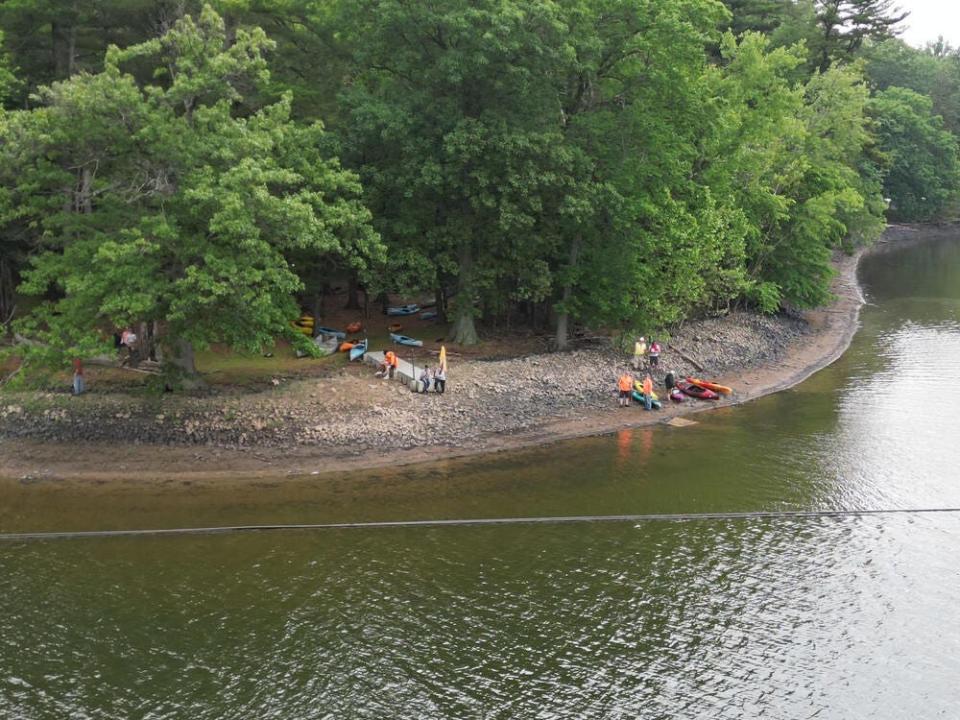Yeah those summer storms ruined your picnic. But North Jersey reservoirs are nearly full
The operators of North Jersey drinking water reservoirs welcomed heavy rainfall throughout July, easing fears after reservoir levels fell significantly during the dry spring.
While recent storms might have ruined some outdoor plans, the weather benefited North Jersey residents by replenishing their water supply.
Reservoirs in North Jersey are nearly full, according to state Department of Environmental Protection data.
The North Jersey District Water Supply Commission, which operates the Wanaque Reservoir and the backup Monksville Reservoir, saw the two of them rise 7% from July 1, bringing them to about 90% capacity combined on Tuesday, said spokesperson Bill Maer.
North Jersey braces for heat wave: Temperatures could 'reach the century mark'
"This summer's rain has significantly help bolster the agency’s water supply," Maer said. "We are thrilled with the current levels of our reservoirs and hope these levels stay consistent as we continue through the summer months.

High reservoir levels are a dramatic improvement from last summer. The Oradell Reservoir stood at 70% capacity last July, but today it measures 95% full, said Debra Vial, a spokesperson for Veolia, the utility that operates several reservoirs along the Hackensack River in Bergen County. The reservoirs supply 800,000 customers in Bergen and Hudson counties.
“Being full allows us to serve our customers well through the rest of the hot season,” Vial said.
Much needed rain after a sunny but dry spring
Dry weather in May and June also concerned staff at Ridgewood Water, who worried the system would experience one of the highest peak demand seasons in almost a decade, said Richard Calbi, the utility's director of operations. The municipally owned utility serves 62,000 customers in Ridgewood, Midland Park, Glen Rock and Wyckoff. Unlike the larger Veolia system, Ridgewood Water relies on wells that tap an aquifer.
July rains in NJ: 'Perfect storm for mosquitoes.' Here's how to avoid the bites
Increased demand during the spring required Veolia to tap into the Wanaque Reservoir and pump about 10% more water than normal each day. The Oradell Reservoir and Veolia's other reservoirs along the Hackensack River had hovered around 75% as of June 12.
May was one of the driest on record, which helped prompt wildfires from Pompton Lakes to the forests of South Jersey. By June, Gov. Phil Murphy was exhorting New Jerseyans to reduce water use.
There also wasn't much melting snowpack to aid reservoirs this spring. New Jersey experienced its third-least-snowy season on record, with an average of 4.8 inches statewide.
But given the uptick in rainfall, July "is looking to be one of the lowest peak season water use months in a long time," Calbi said.
The Wanaque Reservoir watershed experienced more than 8 inches of rainfall this month. The Wanaque, the state's largest reservoir, supplies up to 190 million gallons per day to Newark, Wayne, Clifton, Paterson, Passaic, Montclair and other towns.
Bergen and Hudson counties used about 120 million gallons of water per day on average, according to Vial, about 4 million less than previous months.
Still dry to the south
Meanwhile, areas in South and Central Jersey are abnormally dry, according to the most recent U.S. Drought Monitor. Portions of Atlantic, Cumberland and Monmouth counties, along with most of Cape May County, are experiencing moderate drought conditions.
North Jersey: Looking to cool off? Here are five places you can swim this summer
Reservoir levels typically fall during summer, but it’s not ideal for them to plummet as rapidly as they did in May and June, said David Robinson, the state climatologist and a Rutgers professor.
Replenishing reservoirs proves difficult during warm months, unless it’s a particularly wet summer, because evaporation often exceeds total rainfall.
New Jersey may experience more rain on Thursday and Saturday. It will be dry but cloudy early next week, according to AccuWeather.
This article originally appeared on NorthJersey.com: Rainy July boosted North Jersey water supply, filled local reservoirs

